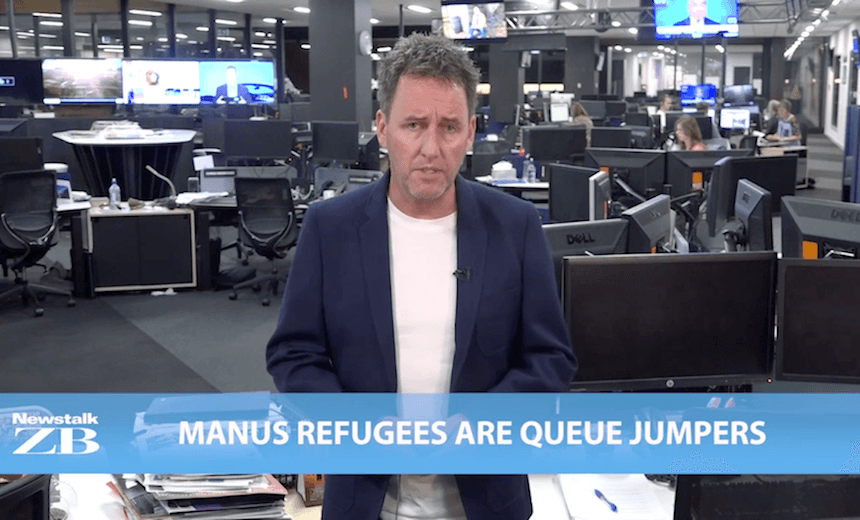Mike Hosking has made another big mistake, this time on the UN’s refugee convention. Amnesty International New Zealand’s Grant Bayldon gives him a lesson in international law.
In alarming misrepresentation of international law in today’s Mike’s Minute, Mike Hosking has applauded the Australian prime minister’s rejection of New Zealand’s offer to help resettle refugees from offshore detention centres.
It’s not often that you’ll hear Hosking use the United Nations to justify a position. But there it is: the United Nation has a resettlement programme, so the men, women and children now trapped in hellish limbo on Manus and Nauru Islands should have waited their turn.
Hosking is right on one thing – that New Zealand and Australia are indeed signatories to the UN Refugee Convention – but he’s not right about a lot else.
Because if you take a look at what both countries have signed up to under the Refugee Convention, there are two parts to it and it includes taking in those who seek asylum on our shores.
The first is a commitment to resettle refugees – that’s what our refugee quota is all about. But the reality is that resettlement numbers don’t come close to meeting the need: it’s more a lottery, there is literally no queue.
And so most refugees seek protection under the second part of the refugee convention – a commitment by countries to offer safety to people who come directly to them and have a genuine case for protection as refugees. This legal commitment to being able to seek asylum applies whether they come by plane, or by boat as those on Manus and Nauru did.
Being declared a bona fide refugee is a high bar. To reach it you have to show that you have a legitimate fear of persecution or war. Yet of those who have been assessed the vast majority have been given refugee status – almost 90% on Nauru and almost 80% on Manus.
Among them is a man with his two sons on Nauru who escaped repeated threats and attacks by the Taliban. They lost everything, and his wife died soon after he and they fled. But it is the Australian government that has broken them. After being detained for years without an end in sight, he is terrified that one of his young boys will kill himself – he hides everything sharp in their tiny room to protect his sons.
This is just one case, but every one of the men, women and children in Australian offshore detention has their own story of the despair that indefinite detention brings. What they all tell us is that they just want the chance to restart their lives in safety.
Listen to the Australian prime minister and you’d think it was the Australian government, rather than the refugees, that has it tough. But a few thousand people seeking safety in your country is not a refugee crisis. A refugee crisis is what’s been unfolding in Lebanon – a country with a similar population to New Zealand hosting a million people who have been forced to flee by the war in Syria.
The reality is that the abusive Australian government treatment of refugees has nothing to do with following the rules. Australia has been repeatedly in breach of international law. It has picked up already vulnerable people – often from international waters – and transferred them against their wills to remote detention centres. It has failed to provide adequate services. It has taken away what we all need, hope for the future. It has committed what both the United Nations and Amnesty International have found amounts to torture.
And if that wasn’t bad enough, it has now taken away on Manus Island what’s required to sustain life – water and food.
Hosking is right that New Zealand’s offer to rescue people from Australia’s abusive system is partly about emotion: it’s called empathy and we should be proud of this. And even though we all hope that we will never have to flee our homes and seek safety elsewhere, it is only by luck of birth that we’re not currently in that situation ourselves. Empathy is a value we encourage our children to develop and it’s a good sign to see empathy reflected in our decision making.
But New Zealand’s offer is also about honouring our international obligations, sticking to international law and urging Australia to do the same. And that’s where Hosking’s opinion is so troubling to see, let alone in a major news outlet. By completely misrepresenting the legal situation and using inflammatory and incorrect language to malign people who have followed international law, he has further victimised men, women and children who are simply seeking the opportunity to restart their lives.
This is commonsense, these are the rules. And granting the right to asylum – or protection – was the precedent we all set and agreed on when we wrote up that little document called the Universal Declaration of Human Rights.
Amnesty International has investigated the human rights situation on Nauru and had investigators on Manus only last week, including a New Zealand staff member. Read more here.
The Society section is sponsored by AUT. As a contemporary university we’re focused on providing exceptional learning experiences, developing impactful research and forging strong industry partnerships. Start your university journey with us today.
